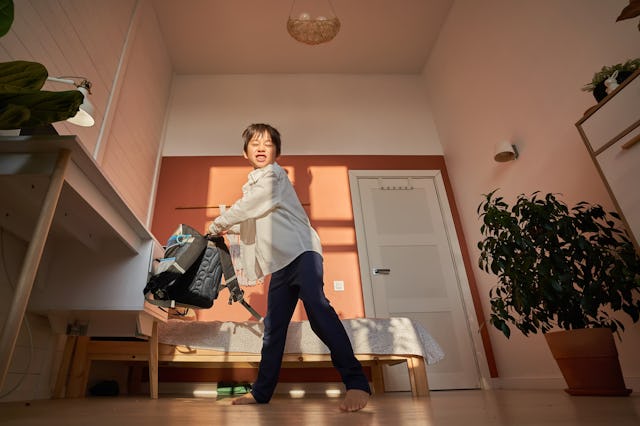I Had An Epiphany Watching A Kid Have A Meltdown
It wasn't my kid throwing a tantrum, which made all the difference.

I recently watched a friend’s kid have a total meltdown at elementary school drop-off one morning. While his sister cheerfully skipped through the gate, he firmly planted his feet to the ground, girding his loins for a stand down, complete with an audience. My friend bent down and talked to him, staying grounded even as he escalated. She gently nudged him toward the gate, while he continued his efforts to retreat in the opposite direction. Negotiation tactics were failing, and neither party was willing to back down. I’ve been there so many times, and just watching them made my heart rate jump.
I find it so, so hard to navigate a public tantrum. While I try my best to remain calm, my blood boils. At the same time, I feel wildly self-conscious. It makes for a perfect spiral: my less-than-idyllic reaction just gives me more fodder to beat myself up with. I’ll judge myself for the empty threats, my raised voice, and my lack of empathy. And then I hit myself with the biggest stick of all: “Your kid would never have a meltdown if you were a good parent.” I know it’s not true, but I can’t stop the thought from bouncing around in my head.
Whenever my kids lose their shit, or go through a stormy couple of weeks, I jump to the assumption it’s because I’m messing up some aspect of my job as a mom. But that day, as I drove away from school, it hit me: When I watched this mom weather a meltdown, I never questioned her ability as a parent, and my respect for her only increased. I had a long-overdue epiphany: Maybe, when my kid loses her shit, it has very little to do with my parenting abilities and a lot to do with the fact that sometimes life is just plain tough. And all of us, myself included, have meltdowns. And there’s a lot about life that you just can’t control.
Shit happens, in other words.
At some point, I got the idea that becoming a perfect parent would ensure that my child would never suffer. Saying it now, I understand how silly it sounds. But I never verbalized it so simply — it was just something I absorbed into my bones. I thought I had a shot at becoming the perfect mom by buying, reading, or transforming my way into an almost god-like being, one who wasn’t driven by emotions, pain, or sleep deprivation. I understand now that I walled off my reactions, instead striving to have the right reaction to every situation.
I was already doing it before my daughter even exited my uterus. I had an epidural and, when she got stuck, rather than accepting that since the beginning of time, some babies get stuck during labor, I convinced myself it was because of the epidural. If I had made the perfect parenting decision, I told myself, she wouldn’t have needed to be intubated.
So many times, I’ve used the victories of others to flog myself. I judge myself off of snippets of other parents, in their most on-the-ball-in-public moments. But as I stood there and watched my friend deal with a tantrum in public, I realized there was another way I could use comparison. One that was less toxic, and more compassionate.
Everybody has their good moments and their bad moments. And I should start directing some of the compassion I had for other parents in their less glamorous moments of parenthood toward myself.
Naturally this realization was put to the test a few days later when my daughter threw an Emmy-worthy tantrum. She was hungry, but she didn’t want any of the 50 snack possibilities I listed. She didn’t want to do her homework, but she didn’t want to take a break.
It seemed there was nothing I could do or say to stop it. I couldn’t scrape together any compassion for myself. All I wanted was for the screaming to stop, but frustration just kept building on both sides, climaxing when my daughter threw a ceramic Christmas ornament on the floor — an angel, by the way — shattering it.
She gasped, stunned, before wailing, “I’m the worst kid ever!” I hugged her, assured her she wasn’t, and glued the angel back together as the tears subsided. “What is this feeling?” she asked.
“What feeling?” I asked.
“The one where you feel like the worst kid ever.”
“Oof,” I said, “That’s a tricky one. It’s shame.”
“Well how do you make it go away?” she asked, snuggling into my chest.
I wondered how I could explain a concept I struggled with myself. That she had to remember her worth wasn’t rooted in whether or not she made mistakes. It just was. I wrote her a mantra to repeat: “I am human, and I made a mistake, but that doesn’t change how loved I am.” We repeated it together, over and over.
It isn’t my job to have a perfect reaction. And it isn’t my job to raise a kid who doesn’t throw tantrums. It’s my job to teach her that mistakes happen — and they don’t change how loved she is. And for me to teach her that, I have to understand: I’m going to make a lot of mistakes as a parent, and that doesn’t change how loved I am, nor does it mean I love my daughters any less.
Laura Onstot writes to maintain her sanity after transitioning from a career as a research nurse to stay-at-home motherhood. In her spare time, she can be found sleeping on the couch while she lets her kids binge-watch TV. She blogs at Nomad’s Land, or you can follow her on Twitter @LauraOnstot.